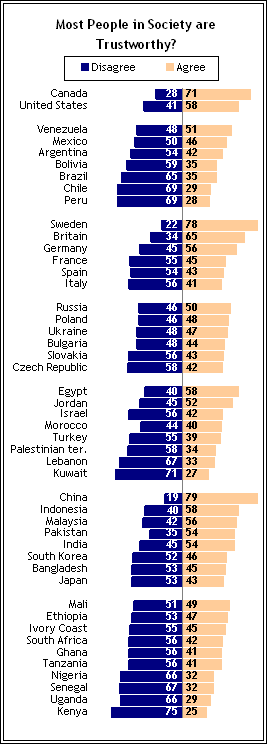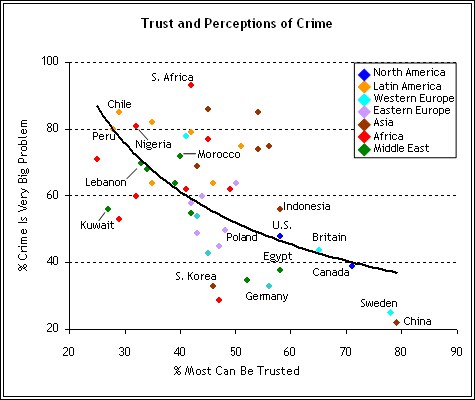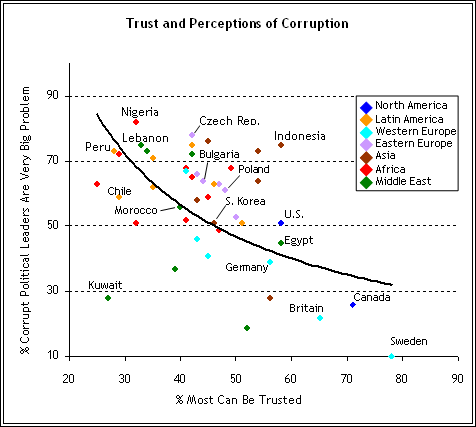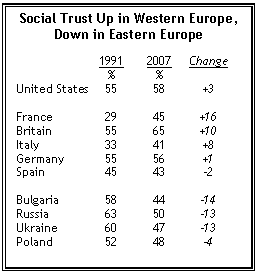by Richard Wike, Associate Director and Kathleen Holzwart, Research Analyst, Pew Global Attitudes Project
 “Trust,” political scientist Eric Uslaner has written, “is the chicken soup of social life.”1 Over the last two decades, social scientists have repeatedly suggested that good things tend to happen in societies where people tend to trust each other — they have stronger democracies, richer economies, better health, and they suffer less often from any number of social ills.
“Trust,” political scientist Eric Uslaner has written, “is the chicken soup of social life.”1 Over the last two decades, social scientists have repeatedly suggested that good things tend to happen in societies where people tend to trust each other — they have stronger democracies, richer economies, better health, and they suffer less often from any number of social ills.
As the 2007 Pew Global Attitudes survey highlighted, the degree of trust in societies varies considerably around the world.2 Moreover, while the survey finds that social trust is not strongly correlated with our measures of democracy or economic performance, it is strongly correlated with views about two other important issues: crime and corruption. In countries where people generally trust one another, there are fewer worries about crime or corrupt political leaders.
The survey also found that in Eastern Europe — a region where concerns about corruption are widespread — the tumultuous changes that followed the fall of communism have taken their toll on social trust. The percentage of Russians, Ukrainians and Bulgarians who believe most people are trustworthy has declined steeply since the early 1990s.
Chinese, Swedes Most Trusting
Among the 47 countries included in the 2007 poll, China had the highest level of social trust: Almost eight-in-ten Chinese (79%) agreed with the statement “Most people in this society are trustworthy.” Although no other Asian nation matches China’s score, levels of trust are relatively high in the region, with majorities in Indonesia, Malaysia, Pakistan, and India saying most people in their respective countries can be trusted.
Swedes (78%) came in a very close second to the Chinese on the social trust scale. The results from elsewhere in Western Europe indicated something of a north-south divide — while most Swedes, Brits, and Germans said people in their countries are generally trustworthy, fewer than half in France, Spain, and Italy agreed. Meanwhile, Eastern Europeans tend to resemble their more southern neighbors on this issue. At 50%, Russians exhibited the highest level of trust among the Eastern European countries included in the study.
Trust also tends to run low in the Middle East, Latin America, and Africa, although in all three regions substantial variation is seen. For instance, while nearly six-in-ten Egyptians (58%) believed most people can be trusted, only 27% of Kuwaitis took this position. Similarly, in Latin America levels of trust ran from 51% in Venezuela down to 28% in Peru. Among African nations, Malians were roughly split between those who agree (49%) that most of their fellow citizens are trustworthy and those who disagree (51%), while Kenyans, with 25% agreeing and 75% disagreeing, were much more pessimistic in this poll, which was conducted several months before the outbreak of violence that followed last December’s contested presidential election.
Since Harvard’s Robert Putnam advanced his “bowling alone” thesis in the mid-1990s, numerous researchers have found evidence suggesting that America’s social capital has declined over the last half century.3 However, as the Pew survey demonstrates, when it comes to social trust (one indicator of social capital), Americans still compare quite favorably with other publics — 58% believe others in this society can be trusted. Only the Chinese, Swedish, Canadian, and British publics express greater levels of social trust.
Trust and Crime
High levels of social capital and social trust have been linked to any number of positive social outcomes, including low crime rates. Looking at research on crime in U.S. states and neighborhoods, Putnam finds that places with low social capital tend to be more dangerous. More recently, sociologists Steven Messner, Eric Baumer, and Richard Rosenfeld have found a link between a community’s level of social trust and its homicide rate.4 And, as data from the 2007 Pew survey demonstrates, there is evidence that the relationship between social trust and crime exists outside the U.S. as well.
As the figure below illustrates, in countries with high levels of trust, people are generally less likely to say crime is a very big problem for their country (the correlation coefficient for responses to the two questions is -.56). Most of the countries surveyed fit the overall pattern, including the United States, where concerns about crime are about where one would expect, given the relatively high degree of social trust.
There are, however, some outliers. For example, South Africans — who have been plagued by crime in recent years — are more concerned about crime than would be expected, based solely on their level of social trust. Meanwhile, crime fears are even less common in Sweden and China than their high levels of trust would have predicted.
Trust and Corruption
The 2007 Pew survey found that in countries where people generally trust one another, there is also more confidence in the integrity of political leaders. As the figure below shows, the relationship between trust and corruption resembles the one between trust and crime. The percentage of people rating corrupt political leaders as a very big problem tends to be lower in countries that have high levels of trust such as Sweden, Canada, and Britain (the correlation coefficient is -.54). On the other hand, in nations such as Nigeria and Lebanon, trust is rare and concerns about political corruption are widespread.
Again, there are outliers. Kuwait is both a low trust and low corruption society. Indonesia is a high trust, high corruption country. And the Swedes are once again even less concerned about corruption than their high score on the trust measure would predict (the question about political corruption was not asked in China, the only country to top the Swedes on trust). Meanwhile, Americans — who have witnessed more than a few high profile political scandals over the last few years — were slightly more concerned about corrupt politicians than would have been expected, based on their reasonably high degree of social trust.
Eastern Europeans also tend to be more worried about corruption than one might anticipate given the level of social trust in the region. In all six Eastern European nations included on the survey, more than half say the issue of corrupt political leaders is a very important problem facing their country. Concern runs especially high in the Czech Republic, where nearly eight-in-ten (78%) see political corruption as a very important problem — only Nigerians express more concern about this issue.
Trust Down in Eastern Europe, Up in West
I n the years that have followed the end of communist rule, social trust has waned considerably in several former Eastern Bloc countries. Since the 1991 Pulse of Europe survey conducted by the Times Mirror Center for the People & the Press (a predecessor of the Pew Research Center for the People & the Press), the percentage of people saying most of their fellow citizens can be trusted has declined by double digits in Bulgaria, Russia, and Ukraine. In 1991 — two years after the fall of the Berlin Wall and just months before the final collapse of the Soviet Union — solid majorities in all three countries said most people could be trusted, but by 2007 these numbers had slipped to 44% in Bulgaria, 50% in Russia, and 47% in Ukraine.
n the years that have followed the end of communist rule, social trust has waned considerably in several former Eastern Bloc countries. Since the 1991 Pulse of Europe survey conducted by the Times Mirror Center for the People & the Press (a predecessor of the Pew Research Center for the People & the Press), the percentage of people saying most of their fellow citizens can be trusted has declined by double digits in Bulgaria, Russia, and Ukraine. In 1991 — two years after the fall of the Berlin Wall and just months before the final collapse of the Soviet Union — solid majorities in all three countries said most people could be trusted, but by 2007 these numbers had slipped to 44% in Bulgaria, 50% in Russia, and 47% in Ukraine.
The pattern has been quite different, however, in Western Europe, where social trust has increased significantly in France, Britain, and Italy. In 1991, both France and Italy scored quite low on this measure — only 33% of Italians and even fewer Frenchmen (29%) trusted most people in their countries. By 2007, these figures had risen to 41% in Italy and 45% in France, still generally lower than elsewhere in Europe, but significantly improved from the early 1990s. With the highest level of trust in Europe, the percentage of the British who agree that most people can be trusted has also increased significantly, jumping from 55% in 1991 to 65% in 2007.
Despite concerns about decreasing social capital, the degree of social trust in the United States is basically the same as it was in 1991. Then, 55% of Americans said most people in society can be trusted, compared with 58% who expressed this view in the 2007 poll.


